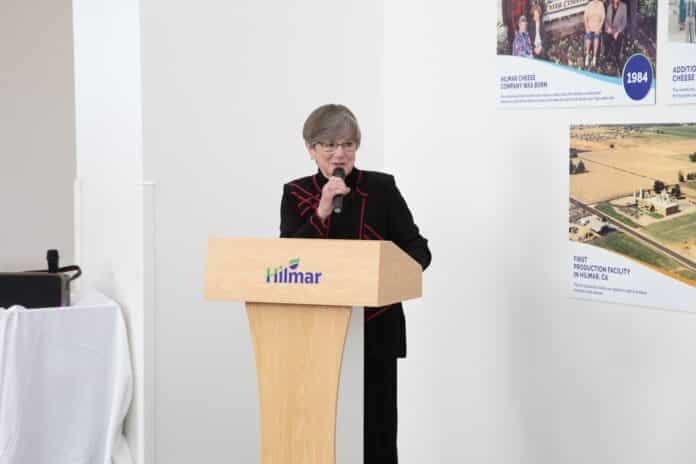TOPEKA – Governor Laura Kelly has signed Senate Substitute for House Bill 2172, creating the water program task force to create a long-term investment program for water with a dedicated revenue source, similar to the state’s rolling 10-year transportation programs. The task force will also evaluate current funding for water and the state’s water planning statutes, submitting reports detailing its findings to the governor and the Kansas Legislature in 2026 and 2027.
“Developing a comprehensive, long-term, and sustainable water program is long overdue and a significant step forward in ensuring Kansas’ water supply is preserved for generations to come,” Governor Laura Kelly said. “Thanks to this legislation, there will now be a bipartisan strategic plan with a dedicated funding source to tackle Kansas’ most pressing water challenges. I commend the Legislature for advancing my proposal and acting on this critical issue.”
The task force will include 13 voting members spearheaded by a bipartisan group of legislators. Of those 13 voting members, six members will be Kansans appointed by legislative leadership. The task force also includes a five-member water planning work group, which is tasked with reviewing and modernizing the State Water Resources Planning Act.
“Water is truly vital to Kansas agriculture, business, and communities throughout the state,” said Speaker of the Kansas House of Representatives Dan Hawkins. “I commend Chairs Minnix and Rahjes, along with the members of the House Water and Agriculture and Natural Resources Committees, for their leadership in forming the Water Task Force, an essential step toward maintaining our precious water resources.”
The task force is charged with evaluating major risks to Kansas’ water quality and quantity, including any impact on current and future economic growth. It will also examine current funding for water and determine whether this funding is sufficient to address the water issues included in the State Water Plan, including Kansas’ current and future water infrastructure needs. The task force will represent every corner of Kansas by including at least one member from each of the five conservation regions of the state.
“This is a critical step forward in addressing Kansas’ water challenges by establishing a dedicated task force and work group to guide our state’s water policy and funding decisions,” said Kansas Senate President Ty Masterson. “This bill reflects a bipartisan legislative commitment to ensuring sustainable water resources for future generations, and I’m proud to see it move forward with the governor’s support.”
The task force will prepare and submit a preliminary report to the governor and Legislature on or before Jan. 31, 2026, and a final report on Jan. 31, 2027. The report will include recommendations on the water program’s long-term structure to address Kansas’ current and future water needs, the roles and responsibilities of the state, municipalities, and regional entities, and identifying a dedicated funding source for the State Water Plan fund.
“Establishing a task force that is dedicated to making progress on Kansas’ water issues is critical to the success of our agriculture industry and economy,” said Representative for House District 110 Ken Rahjes. “This bill will allow us to take steps so our agriculture communities and rural areas can thrive. It’s crucial we secure Kansas’ water supply now, so our state remains an agricultural and economic powerhouse for decades to come.”
Governor Kelly encouraged the Legislature to form the task force during her State of the State address in January. The Kelly Administration and Kansas Water Authority also conducted 14 public meetings across the state in 2024 to gather feedback from Kansans on local priorities and needs for a long-term program. The results of these meetings were published in the Strategic Implementation Framework for water, which can serve as a blueprint for the task force’s work in constructing a long-term, well-resourced water program.
“Protecting Kansas’ water is paramount for our generation and future generations of Kansans,” said Representative for House District 22 Lindsey Vaughn. “In passing this legislation, the Legislature and Governor Kelly are taking a critical step to ensuring we have a long-term strategic plan for a safe and secure water supply. I’m proud to support this groundbreaking bill and look forward to seeing everything the task force accomplishes.”
In addition to Senate Substitute for House Bill 2172, Governor Kelly also signed the following bipartisan bills:
Substitute for Senate Bill 45: Adjusts how certain K-12 students are included in graduation rate calculations.
Substitute for Senate Bill 54: Enhances transparency by creating a process for judicial review of third-party funding agreements in court proceedings.
House Bill 2016: Ensures that active military members, their spouses, and dependents that are stationed in Kansas but have maintained residency in another state are able to serve as poll workers for Kansas elections. The bill also allows county election officers to remove the name of a registered voter from the registration books when an obituary for such voter is published online, as well as clarifying technical requirements for advanced ballot applications.
House Bill 2030: Excludes dealers and manufacturers of non-motorized trailers from certain provisions of the Vehicle Dealers and Manufacturers Licensing Act.
House Bill 2118: Provides new protections for Kansas consumers by requiring any private entity that solicits a fee for filing or retrieving certain government documents to provide disclaimers to consumers that said solicitations are not made by or on behalf of a government agency.
House Bill 2122: Increases the annual license fees of electric and hybrid vehicles, ensuring that electric vehicle drivers pay their fair share to maintain Kansas highways. The bill also aligns quarterly truck payment statutes for interstate and intrastate motor carriers.
House Bill 2168: Extends the amount of time required for certain reports to be filed by public land surveys from 30 to 90 days, aligning Kansas with industry standards.
House Bill 2242: Authorizes the governor to accept requests of concurrent jurisdiction from the federal government in certain circumstances, allowing juvenile incidents that occur on federal military installations to be adjudicated with state resources and in state juvenile courts which are better equipped to address such matters than federal courts.





